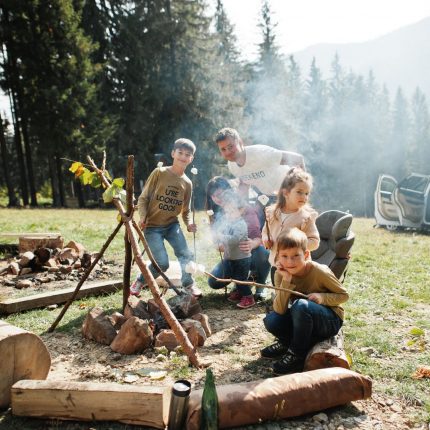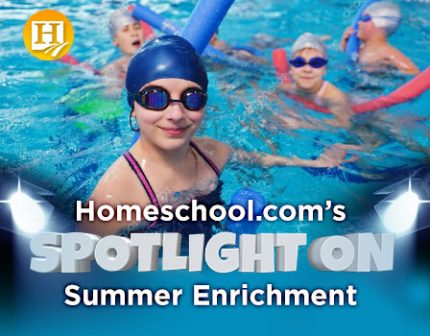Although the school year has come to an end, that doesn’t mean learning should! Preventing the summer slide is a very real concern for homeschooling families. Statistics show that students lose a good amount of learning during the summer months IF they don’t engage in brain-challenging activities. What’s worse is that this regression builds upon itself so students start out losing a couple months of learning and can eventually find themselves several years behind their peers. To prevent this from happening, you should explore summer enrichment options for your students.
Why Is Summer Enrichment Important?
Most of the time, students look forward to the summer as a time they can get by with doing very little work. They’re looking forward to sleeping in later and not being bogged down with assignments until late at night. There’s nothing wrong with feeling this way especially after a long year spent doing schoolwork.
However, there are many reasons students benefit from summer enrichment. Fundamentally, it keeps their minds sharp and prevents the summer slide. By continuing to work over the summer, students don’t need to spend the first part of the following fall in review; instead, they continue progressing and moving forward. Another reason summer enrichment is important is that it keeps students active. Organized programs such as day camps usually strive to keep students from staying plugged in all day. Rather, they focus on outdoor activities students can do to keep physically fit.

Summer enrichment also helps build confidence in students. By continuing coursework through the summer months, students are able to start the next school year off confident that they’ll do well. In fact, a recent study (2013) showed that students who engage in summer learning ended their summers with vocabulary skills much closer to their grade level and increased their instructional level by about ⅓ of a grade level. According to the research, this jump in ability levels was even more significant for English Language Learners. Furthermore, students’ overall attitudes toward reading improved as did their reading abilities.
To keep their skills sharp, students need to stay the course for the entire calendar year. How can this be accomplished without getting burnt out? The trick is to mix it up!
Summertime Teaching Ideas
When plans to continue learning over the summer are announced, parents may face students who are less than thrilled at the thought. After all, students reason, this is summer break and they’re supposed to be on vacation! It’s important to emphasize to students that school may stop but learning itself never stops. Over the summer, they’ll continue learning – not “schooling.” It may be semantics to you but to students, this perspective can make all the difference in cooperation. What’s the best way to implement summer enrichment in your homeschool?
- Broaden their horizons. Instead of just focusing on core subjects, teach your students about things that may not even look like “school” such as gardening, cooking, or learning to play an instrument. Running out of ideas of things to do? Check out our list of 101 Things to Do This Summer! We guarantee you’ll find ideas you’ve never thought of before. Print the list and create a checklist for your students to complete independently.
- Focus on language arts and math. When people speak of the summer slide, they’re not referring to students forgetting the parts of a cell. They’re usually referring to students forgetting important skills such as when to use certain mathematical formulas and how to analyze a passage for theme. For younger students, skills obtained during the school year might include reading fluently and quickly knowing math facts. Whatever it may mean for your student, be sure to provide a lot of review of the things he or she learned this past school year.
- Give plenty of outdoor time. In many areas, the summer months are the only months the weather is
 pleasant enough to be outside for any length of time. Take advantage of this by spending a good amount of time outside with your student. You can also take your summer learning activities outside. In addition, the outdoors provides plenty of opportunities for nature walks and snapping photos for a nature journal.
pleasant enough to be outside for any length of time. Take advantage of this by spending a good amount of time outside with your student. You can also take your summer learning activities outside. In addition, the outdoors provides plenty of opportunities for nature walks and snapping photos for a nature journal. - Follow a part-time schedule. Instead of holding “school” during your normal school hours, consider doing a part-time schedule where you only do school 3-4 days a week or do half-days. This way, your children still have days off (and so do you). You’re much less likely to experience homeschool burnout if you have some time off on a regular basis.
- Do group schooling! One day a week, you could do schooling with friends. When you do so, you can do your schooling activities, enjoy lunch together, and take pleasure in your friends’ company afterward. It may seem more feasible to rotate houses so you’re not hosting every week
Summer Enrichment Curriculum Options
All of this may sound great but without a specific plan or curriculum, you may feel confused about what to do. We’ve searched through homeschool-friendly programs designed for summer enrichment to help you along the way!
- Time4Learning: Time4Learning offers a complete summer learning curriculum that covers language arts and math with added science and history/social studies courses. It’s completely online, alleviating you of any concerns to do with making room for more curriculum. Plus, since it’s self-paced, your students know exactly what to do each day (just click to find the star indicating the most recent lesson). Bonus: the program grades everything for you! If you’d prefer, you can pick and choose which lessons your students will complete so you won’t feel like they’re missing anything by skipping over lessons. This is fantastic for families who like to vacation over the summer. Forget about keeping up with student work – Time4Learning has you covered!
- Time4Writing: Whether your students are in elementary, middle school, or high school, they’ll benefit from Time4Writing’s 8-week certified teacher-led program. The teachers provide one-on-one instruction and personalized feedback to help your students improve their writing. The program was designed for students at all levels and with various abilities, so it doesn’t matter if you have a reluctant writer or a future author on your hands. The teachers meet your students where they’re “at” in their abilities and go from there! Perfect for summer learning since it only lasts 8 weeks.
- Bob Jones University – Vacation Stations: The Vacation Stations curriculum from Bob Jones was designed for summer use. Rising 1st through 7th graders can benefit from a review from the previous year and get ready for the upcoming school year. By completing just two pages a day, your students can avoid losing important skills in math, language arts, and reading.
- Summer Bridge books: From PreK to 8th grade, these books have been around for many years and for good reason. In just 15 minutes each day, students maintain important math, reading, writing, and language skills. The activities help keep kids academically and physically fit over the summer months. Plus, there are even hands-on activities kids can do anywhere. If you’re planning to take a vacation for a good part of the summer and would like something portable, this could be a good fit.
Summer is a great time for students to hone in on skills they’re lacking, reinforce concepts they’ve learned, or get ahead of the academic game. Physically, your students may be ready for a break but academically speaking, you may want them to keep going at a gentler pace than usual. Keep their minds sharp and ready for learning by implementing a summer enrichment program into your summer break!
Tasha Swearingen
Tasha is a homeschooling mom to 5 and has been homeschooling for 14 years. Currently, her children's ages span from toddler to young adult. Tasha has a Bachelor's of Science degree in Social Sciences from Florida State University and is working on her MBA through SNHU/Berklee School of Music.
Latest Posts

As homeschooling continues to grow in popularity, more parents are taking on the challenge of providing a comprehensive education that not only meets academic standards but also prepares their…
Read more >
June has come and gone, and summer is in full swing! Whether you're traveling this summer or staying close to home, we hope you're enjoying this time with your family. We wanted this month's…
Read more >
Summer is an all-around favorite season for most people. In the U.S., it’s even more exciting for many of us since we get to celebrate Independence Day! The Fourth of July is a wonderful…
Read more >


